|
|
|
Sort Order |
|
|
|
Items / Page
|
|
|
|
|
|
|
| Srl | Item |
| 1 |
ID:
100467
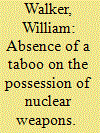

|
|
|
| 2 |
ID:
072176
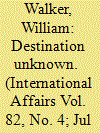

|
|
|
| 3 |
ID:
048266
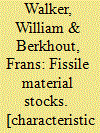

|
|
|
|
|
| Publication |
New York, United Nations, 1999.
|
| Description |
x, 60p.
|
| Series |
UNIDIR/99/8
|
| Standard Number |
9290451319
|
|
|
|
|
|
|
|
|
|
|
|
Copies: C:2/I:0,R:0,Q:0
Circulation
| Accession# | Call# | Current Location | Status | Policy | Location |
| 041383 | 355.825119/WAL 041383 | Main | On Shelf | General | |
| 041973 | 355.825119/WAL 041973 | Main | On Shelf | General | |
|
|
|
|
| 4 |
ID:
131418
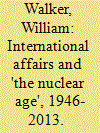

|
|
|
|
|
| Publication |
2014.
|
| Summary/Abstract |
The article reflects on the distinguished record of publication, in around 130 articles over nearly seventy years, on nuclear politics in International Affairs. Although constituting a small drop in the torrent of writings on nuclear matters since 1945, it can fairly be regarded as the most significant contribution to nuclear discourse by any journal outside the United States. The articles published in International Affairs have covered a wide range of issues including nuclear deterrence and strategy, arms control, non-proliferation and disarmament, and the policies-and drivers of policy-of countries, in particular the UK and US. Authors have included P. M. S. Blackett, Wyn Bowen, Alastair Buchan, Hedley Bull, Pierre Hassner, Michael Howard, Rebecca Johnson, Michael MccGwire, Michael Quinlan, Nick Ritchie, John Simpson and David Yost. The discussion concludes with Ian Smart's article of 1975 in which he contemplates the nature of the 'nuclear age' and its persistence or passing, and comments on governments' 'fatuous' attachment of prestige value to nuclear weapons.
|
|
|
|
|
|
|
|
|
|
|
|
|
|
|
|
| 5 |
ID:
133280
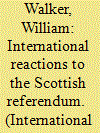

|
|
|
|
|
| Publication |
2014.
|
| Summary/Abstract |
The referendum on whether Scotland should become an independent country will be held on 18 September 2014. This article reflects on the evolution of foreign governments' attitudes towards the referendum since its confirmation in October 2012, and on their expectations should a 'yes' vote result. With few exceptions, they have adopted a policy of non-intervention, treating the referendum as the UK's domestic affair. President Obama's expression on 5 June 2014 of his desire for the UK to remain 'a strong, robust, united and effective partner' may, however, be seen as a sign of increasing apprehension abroad. Concerns of foreign governments aroused by the referendum include the diminution of the UK's power and role in international affairs, the possible encouragement of other secessionist movements, and disturbance to international organizations and alliances. It is commonly assumed that Scotland would become a reasonably prosperous and reliable small state. But how would the rest of the UK (rUK), a much more powerful and populous country, respond to 'the loss of Scotland'? How would it affect the UK's already unsettled relations with the EU, including the prospect of a referendum on EU membership? Despite many uncertainties and a febrile political atmosphere, it is widely expected abroad that Scotland and rUK would settle into a cooperative relationship after a difficult transitional period, and that an independent Scotland would be accepted into the EU and NATO if it displayed flexibility on important issues.
|
|
|
|
|
|
|
|
|
|
|
|
|
|
|
|
| 6 |
ID:
158677
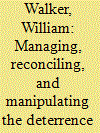

|
|
|
|
|
| Summary/Abstract |
Norm contestation and the search for legitimate and acceptable compromise have been persistent features of the nuclear non-proliferation regime. They have also marked the domestic politics of nuclear weapons, especially within democracies. How do those internal and external contestations and searches for compromise interact? Attention will focus on the United Kingdom that stands out for the openness of domestic debate on nuclear policy, division within political parties, and the role granted to parliament. The United Kingdom has held to an idea of order and responsible stewardship entailing the managed coexistence of nuclear deterrence, arms control, and non-proliferation. Active pursuit of multilateral nuclear disarmament to this end has also helped governments to constrain domestic opposition to the nuclear force's (Trident's) renewal and modernization. The United Kingdom's alignment of domestic and international stances on nuclear weapons is today being jeopardized by its internal turmoil and by international discord over nuclear norms and rules.
|
|
|
|
|
|
|
|
|
|
|
|
|
|
|
|
| 7 |
ID:
077678
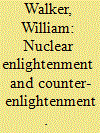

|
|
|
|
|
| Publication |
2007.
|
| Summary/Abstract |
Given the apocalyptic nature of nuclear weapons, how can states establish an international order that ensures survival while allowing the weapons to be used in controlled ways to discourage great wars, and while allowing nuclear technology to dif use for civil purposes? How can the possession of nuclear weapons by a few states be reconciled with their renunciation by the majority of states? Which political strategies can best deliver an international nuclear order that is effective, legitimate and durable? These have been central questions in the nuclear age. This article suggests that the effort to construct such an order displayed the characteristics of an enlightenment project, with its emphasis on balance and rationality, the quest for justice and trust among states, the feasibility of instrumental regulation, and the attachment to hope and progress. With the Nuclear Non-Proliferation Treaty at its heart, it necessarily gave precedence to diplomacy and containment over preventive war. The reasons why this conception of nuclear order was discarded by its erstwhile champion, the United States, in favour of one bearing traits of counter-enlightenment, are explored. Its alternative strategy can now be declared a failure. Avoidance of a greater disorder depends on recognition that the problem of nuclear order is more than the problem of proliferation, or of non-compliance, and on recovery-whatever the difficulties-of the cooperative yet pragmatic sensibility that lay behind the prior approach to order
|
|
|
|
|
|
|
|
|
|
|
|
|
|
|
|
| 8 |
ID:
042918
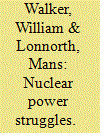

|
|
|
|
|
| Publication |
London, George Allen and Unwin, 1983.
|
| Description |
xii, 204p.
|
| Standard Number |
0043381049
|
|
|
|
|
|
|
|
|
|
|
|
Copies: C:1/I:0,R:0,Q:0
Circulation
| Accession# | Call# | Current Location | Status | Policy | Location |
| 022322 | 341.734/WAL 022322 | Main | On Shelf | General | |
|
|
|
|
| 9 |
ID:
049134
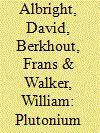

|
|
|
|
|
| Publication |
Oxford, Oxford University Press, 1997.
|
| Description |
xxxii, 502p.
|
| Standard Number |
0198280092
|
|
|
|
|
|
|
|
|
|
|
|
Copies: C:1/I:0,R:0,Q:0
Circulation
| Accession# | Call# | Current Location | Status | Policy | Location |
| 038811 | 338.4762148335/ALB 038811 | Main | On Shelf | General | |
|
|
|
|
| 10 |
ID:
127123
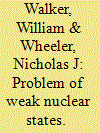

|
|
|
|
|
| Publication |
2013.
|
| Summary/Abstract |
Governments are increasingly recognizing the problem posed by internally weak nuclear-capable states. The problem, however, is under-theorized. This article brings together literature on sovereignty and international order, the nonproliferation regime, and weak states, and introduces new concepts to provide a more structured understanding of this problem. Insight comes from focusing attention on the function and governance of two nuclear estates (termed the production and operational estates), and on their resilience to decay and disorder occurring within the state and society. Drawing on empirical observation, the authors suggest a typology of weakness in nuclear states, involving state fragmentation typified by the former Soviet Union, the "hard weak state" typified by North Korea, and the internally conflicted state typified by Pakistan. Although these types give rise to distinctive difficulties, their alleviation depends heavily on the maintenance of internal authority within the state and estates, the presence or absence of cooperative relations, and the international regulatory framework's vitality.
|
|
|
|
|
|
|
|
|
|
|
|
|
|
|
|
| 11 |
ID:
073983
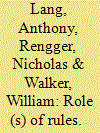

|
|
|
|
|
| Publication |
2006.
|
| Summary/Abstract |
This article explores the various roles that rules play in international relations. The article responds to the current international situation in which rules are being contested by numerous agents in a range of issue areas. While rules, by their very nature, will result in conflicting interpretations in social and political realms, these disagreements at the international level have the added danger of undermining international order. The article explores the nature of rules, focusing on moral and legal dimensions as they operate at the international level. We then turn to an exploration of debates about legitimacy, the impact of technology on rules and rule-making, and the dilemmas of enforcement. We conclude that while rules are a necessary part of any just political order, the dilemmas generated at the global level necessitate careful consideration of the very nature of rules. The responses to the article that follow this one seek to explore some of these issues and their relevance to more specific international issues.
|
|
|
|
|
|
|
|
|
|
|
|
|
|
|
|
| 12 |
ID:
141113
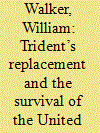

|
|
|
|
|
| Summary/Abstract |
The decision to replace, like-for-like, the United Kingdom’s fleet of nuclear-armed submarines carrying Trident ballistic missiles was taken in March 2007 – before the financial crisis and the rise to power in Scotland of the Scottish National Party (SNP). Neither event was anticipated then. The recession and budgetary constraints that followed the banking collapses of 2008 had little effect on the project in its preparatory phase, when spending was modest. But the announcement of a referendum on Scotland’s independence, to be held in September 2014, threw a spanner into the works. The SNP pledged to evict nuclear submarines from their bases in the Clyde when Scotland attained the legal rights and powers of a sovereign state. Since there appeared to be no plausible alternative bases in England and Wales, a ‘yes’ vote in the referendum might have ended the UK’s long engagement with nuclear weapons.
|
|
|
|
|
|
|
|
|
|
|
|
|
|
|
|
| 13 |
ID:
095072
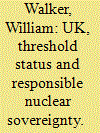

|
|
|
|
|
| Publication |
2010.
|
| Summary/Abstract |
The example of the UK is used to explore two linked ideas relevant to the current international politics of nuclear weapons: that of the threshold state, whereby a state moves from possession to non-possession of weapons rather than in the opposite direction; and that of responsible nuclear sovereignty, adapting the notion of responsible sovereignty to the nuclear context. The UK regards itself as an exemplar of responsible nuclear sovereignty and is closest to the disarmament threshold, being driven closer by military and economic stresses. Nuclear disarmament will require all nuclear-armed states to approach and cross this threshold, a journey assisted albeit ambiguously by the shared practice and norms of responsible nuclear sovereignty. Yet the nine nuclear-armed states' relations to the threshold differ markedly, raising more questions about the feasibility of the popular model of coordinated disarmament. Although coordination remains desirable, the UK seems more likely to abandon its nuclear force by deciding that 'enough is enough' than through the conclusion of a grand multilateral initiative.
|
|
|
|
|
|
|
|
|
|
|
|
|
|
|
|
| 14 |
ID:
041421
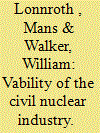

|
|
|
|
|
| Publication |
New York, The Rockefeller Foundation, 1979.
|
| Description |
99p.
|
|
|
|
|
|
|
|
|
|
|
|
Copies: C:1/I:0,R:0,Q:0
Circulation
| Accession# | Call# | Current Location | Status | Policy | Location |
| 018631 | 333.7924/LON 018631 | Main | On Shelf | General | |
|
|
|
|
| 15 |
ID:
143469
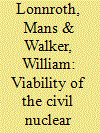

|
|
|
|
|
| Publication |
New York, Rockefeller foundation, 1979.
|
| Description |
99p.pbk
|
| Series |
International Consulatative Group on Nuclear Energy
|
|
|
|
|
|
|
|
|
|
|
|
Copies: C:1/I:0,R:0,Q:0
Circulation
| Accession# | Call# | Current Location | Status | Policy | Location |
| 027907 | 341.734/LON 027907 | Main | On Shelf | General | |
|
|
|
|
| 16 |
ID:
059698
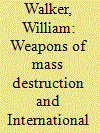

|
|
|
|
|
| Publication |
New York, Oxford University Press, 2004.
|
| Description |
90p.
|
| Series |
Adelphi paper; 370
|
| Standard Number |
019856841
|
|
|
|
|
|
|
|
|
|
|
|
Copies: C:1/I:0,R:0,Q:0
Circulation
| Accession# | Call# | Current Location | Status | Policy | Location |
| 049223 | 327.1745/WAL 049223 | Main | On Shelf | General | |
|
|
|
|
| 17 |
ID:
124863
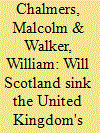

|
|
|
|
|
| Publication |
2013.
|
| Summary/Abstract |
The future of the UK as a nuclear-weapon state could rest in the hands of Scottish voters in their September 2014 referendum on independence. Would an independent Scotland carry out its threat to evict the Trident force currently based there, and would London have any options?
|
|
|
|
|
|
|
|
|
|
|
|
|
|
|
|
| 18 |
ID:
049957
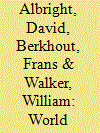

|
|
|
|
|
| Publication |
Oxford, Oxford University Press, 1993.
|
| Description |
xxv, 246p.
|
| Standard Number |
0198291531
|
|
|
|
|
|
|
|
|
|
|
|
Copies: C:1/I:0,R:0,Q:0
Circulation
| Accession# | Call# | Current Location | Status | Policy | Location |
| 034166 | 338.4762148335/ALB 034166 | Main | On Shelf | General | |
|
|
|
|
|
|
|
|
|